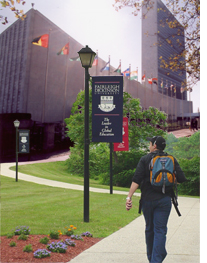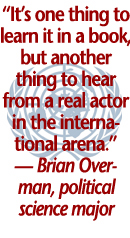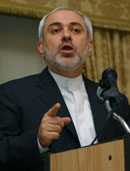

An Illustrious Lineup
C-SPAN’s cameras were rolling, and more than 150 people filled Lenfell Hall in the College at Florham’s Mansion for a recent installment of the U.N. Pathways Lecture Series. The speaker on that night hailed from a country described by American President George Bush as a member of the “Axis of Evil,” and the audience eagerly anticipated the view from the other side.

Amb. Javad Zarif from Iran discussed a “region in turmoil, a region that has fallen behind in the path of modernization.” He described in detail problems such as the absence of democratic institutions, regional rivalries, the superimposition of outside rivalries and mutually reinforcing phobias among those who see the West as the enemy and among those in the West who see “people of the region as terrorists and extremists.” Such misunderstandings, he said, could be overcome through education.
After he was done, students rose to the microphone and asked the ambassador one in-depth question after another. The questions revealed as much as the ambassador’s equally poignant answers. FDU students had done their homework and were discussing everything from internal developments in Iran to its relations with neighbors and the West. That type of enthusiasm and response has been evident at nearly all the lectures held.
“When you see the audience filled with students and they ask probing questions, it’s clear they are interested and even captivated by what they are hearing,”says Michael Sperling, associate provost for interdisciplinary, distributed and global learning.

Amb. Javad Zarif from Iran discussed a “region in turmoil, a region that has fallen behind in the path of modernization.”
One of the students questioning the ambassador was Brian Overman, a political science major. “It’s great to get a first-hand perspective of things that are going on around the world,” he says. “It’s one thing to learn it in a book, but another thing to hear from a real actor in the international arena.”
In addition to the presentations by the ambassadors, the lecture series gives students the opportunity to socialize with the dignitaries during dinner. “The U.N. Pathways program is incredible,” says Kelley Kramer, a communications major and the editor of the Metropolitan Campus student newspaper, The Equinox. “I love to brag about it. Last year, I had dinner with the ambassador from New Zealand and spoke with his wife about global issues affecting New Zealand. This year, I had dinner with the ambassador from Brazil. What amazing experiences!”
Since the lecture series began in spring 2002, the University has welcomed a long line of prominent dignitaries including the president of Malta; ambassadors from Afghanistan, Argentina, Australia, Brazil, Ecuador, Germany, India, Iran, Israel, Japan, Jordan, New Zealand, Qatar, Romania, Spain and Singapore; and other U.N. officials such as the head of the U.N. Development Fund for Women and the undersecretary general and special adviser on Africa. (For a schedule of lectures, which are open to the public, see www.globaleducation.edu.)
In addition, videoconferences hosted from the United Nations and broadcast to the FDU campuses have featured discussions with ambassadors and U.N. officials on a wide range of topics including “Global Citizenship and National Security,” “Women’s Rights Issues,” “Global Health Issues,” “Just War: Does It Really Exist?” and “Universal Human Rights and Infringement of Cultural Values.”
FDU also has invited Rider University, Lawrenceville, N.J.; Lock Haven (Pa.) University; and Roger Williams University, Bristol, R.I., to join in the videoconferences with the U.N. guests. Kendall Brostuen, senior executive for global and international programs at Roger Williams, says, “We’re delighted that Roger Williams University’s students are being given this opportunity to interact with U.N. leaders. Their participation has served to greatly enhance their awareness of global issues and familiarity with those who are making decisions that directly impact those issues.”
Rider University (in particular its students studying international affairs) has taken part in the videoconferences for the last two years. “We have found the speakers, the topics and the style of debate very engaging,” says Roberta Fiske-Rusciano, adjunct assistant professor of political science. “The students use much of this information in their class discussions.”
Sperling says Fairleigh Dickinson is currently working with the United Nations to produce and distribute the videoconferences to a national audience.
Return to Opening Page
Renewing Old Bonds | An Illustrious Lineup
Curricular Connections | In the Front Lines
Students Seize the Initiative | A Long Line of Links
FDU Magazine Home | Table of Contents | FDU Home | Alumni Home | Comments
©Copyright 2004 Fairleigh Dickinson University. All rights reserved.
For a print copy of FDU Magazine, featuring this and other stories, contact Rebecca Maxon, Editor,
201-692-7024 or maxon@fdu.edu.